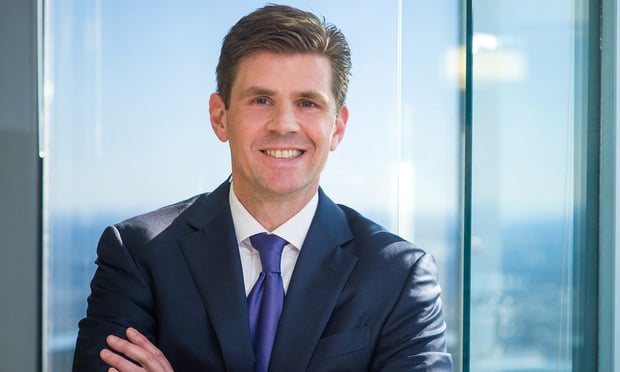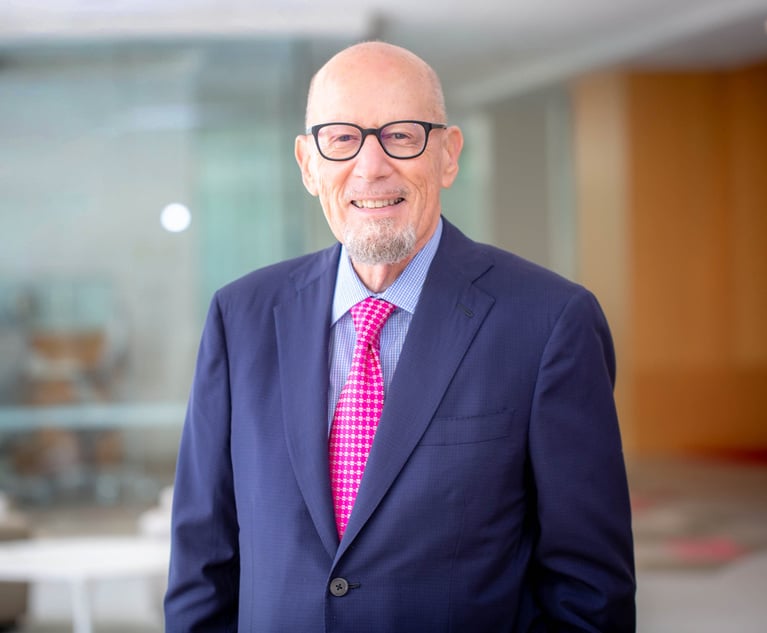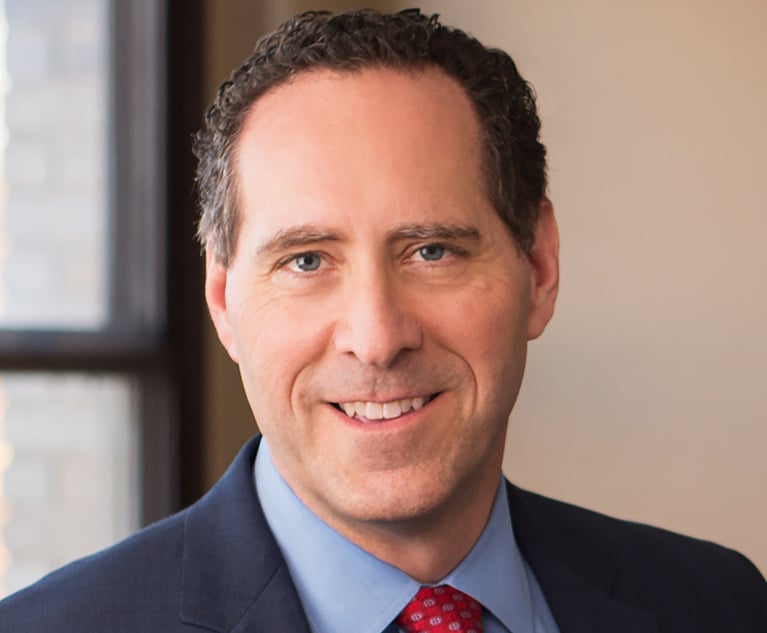In Church Abuse Probe, Finding the 'Bright Light' in Working a Dark Case
Matthew Haverstick of Kleinbard represents the Diocese of Harrisburg and the Diocese of Greensburg, which were included in a recently released grand jury report on child sex abuse in Catholic churches.
August 15, 2018 at 04:48 PM
7 minute read
 Matthew Haverstick of Kleinbard LLC, Philadelphia.
Matthew Haverstick of Kleinbard LLC, Philadelphia.
After the Pennsylvania Supreme Court on Tuesday released a grand jury report detailing decades of child sexual abuse, prosecutors and other lawyers have made clear that the case has only just begun.
Matthew Haverstick is one of the lawyers from Philadelphia-based Kleinbard LLC who is representing the Roman Catholic Diocese of Harrisburg and Roman Catholic Diocese of Greensburg. Also investigated were the Dioceses of Scranton, Pittsburgh, Erie and Allentown.
Haverstick spoke with The Legal about his work with the Catholic Church, which began after the 40th Statewide Investigating Grand Jury served its first subpoenas nearly two years ago.
While the investigation process is inherently adversarial, he said, it's for the best that the grand jury's findings have been made public.
Responses have been edited lightly for length and clarity.
Q: What was your thought process in taking on this work?
I've done a lot of work with or against the AG's office over the years. I enjoy these large and complex, and frankly nonlinear cases where there's a problem, but there's not a beginning or end.
Q: From the start, what have been some of the issues your clients are concerned with, and that you were prepared to argue?
Whenever you represent any organization, you want to be cooperative with the government … but there's always a fine line—at what point does the government's demand for cooperation look more like something that's not in your client's best interest?
Here, the church was completely forthright. … But it's ultimately an adversarial process and there was a lot of emotion charged in these cases, and at times there were disagreements with the other side about how you're going to approach an issue, what the law is, what the constitution says, etc.
Q: How does religion impact the issues surrounding this investigation, including from your own perspective as an individual representing the Catholic Church?
I'm not Catholic. I'm Episcopalian, but I'm also a faithful Episcopalian, I'm active in my church. There is, in this particular case, a moral element to it. I'm sure people on both sides have struggled at times with the issues in this case. The survivors, of course, have suffered immensely and I've seen the church leadership I work for suffer too. These are people who are not responsible for the sins of the past and want to make things right. … I have seen up close the church trying to do the right thing. And that's something that's a bit of a bright light in what is a terrible topic.
Q: Have there been any political conflicts with your other clients or your firm's clients in representing the church?
No, not really. The people I represent in government understand that I have other clients too, and they've been fair. [They know I] have to give them the same zealous representation.
Q: What are the challenges involved in representing a client that has been publicly accused of systemic wrongdoing?
One of the hardest challenges in this part of the case is … first acknowledging and admitting and apologizing for horrible conduct that happened in the past, but also getting the public to understand that that church hasn't existed in a long time … it's not what the church is now. That's been hard. It's easy to read a report like the one that came out and just assume that the Catholic Church is doing the same thing, and there's still predator priests running around today, and that's just not accurate … it can be hard to dispel that kind of misunderstanding.
Q: Do you think there is value to releasing this report and its findings, even though so much time has passed?
I do. This is obviously a story and a history that needs to be told. I think it's important for the survivors and I think that's important for the church too to get this out in the open.
Other organizations … could learn a lot from how the Catholic Church has had to respond and reform since the time of the Boston Globe articles in 2002. It really has had to reform itself.
Q: But not everyone feels that way.
I don't represent any of those people, but I think that's a different issue. Everybody in Pennsylvania gets to exercise their constitutional rights. They were right to raise those.
Q: Have you ever seen another case like this, where the accusations were so broad-based and numerous?
No … I don't think there is or ever will be anything like this case.
Q: How do you handle the volume?
I mostly make it up as I go. I have great, really smart lawyers who work with me. They're far brighter than I am and I really lean on those guys. It's a core group of me and three other people, and an expanded group of six or seven total.
Q: How do you handle the emotional load of this subject matter?
We've all dealt with it differently. I've tried to compartmentalize the implications of some of the things I'm seeing—just getting through the words on the page—but there are times when I let those implications sink in … some of my other colleagues have just lived it moment to moment and experienced the shock and horror of seeing some of the things that are written down. For as many people who have worked on these matters, there are as many ways of dealing with the type of subject matter.
Q: What are you preparing for now? What issues remain to be litigated?
There are those who want to change the statute of limitations in Pennsylvania in ways that I don't think are constitutional. I don't know how that will play out in the General Assembly. That's one area where there will be further developments. Also, I think we're going to learn something important … after the argument at the end of September, on how to protect these constitutional rights that have been raised.
Q: Is there anything else you would like to add?
I think lawyers on both sides of this matter … have probably invested a lot of themselves and a lot of time and I think it's been hard on everyone.
READ MORE:
Will the Church Sex-Abuse Grand Jury Report Lead to New Civil Suits?
Read the Report: Grand Jury Findings Released Outlining Sex Abuse Across Pa.
Pa. Justices Order Release of Redacted Grand Jury Report on Sex Abuse by Clergy
This content has been archived. It is available through our partners, LexisNexis® and Bloomberg Law.
To view this content, please continue to their sites.
Not a Lexis Subscriber?
Subscribe Now
Not a Bloomberg Law Subscriber?
Subscribe Now
NOT FOR REPRINT
© 2025 ALM Global, LLC, All Rights Reserved. Request academic re-use from www.copyright.com. All other uses, submit a request to [email protected]. For more information visit Asset & Logo Licensing.
You Might Like
View All
Cozen O'Connor's Bernard Nash Pioneered the Modern State AGs Practice. Now He's Hanging Up His Boots
6 minute read
Cohen Seglias Leader Discusses Growing From Construction Practice into Full-Service Law Firm


Trending Stories
Who Got The Work
J. Brugh Lower of Gibbons has entered an appearance for industrial equipment supplier Devco Corporation in a pending trademark infringement lawsuit. The suit, accusing the defendant of selling knock-off Graco products, was filed Dec. 18 in New Jersey District Court by Rivkin Radler on behalf of Graco Inc. and Graco Minnesota. The case, assigned to U.S. District Judge Zahid N. Quraishi, is 3:24-cv-11294, Graco Inc. et al v. Devco Corporation.
Who Got The Work
Rebecca Maller-Stein and Kent A. Yalowitz of Arnold & Porter Kaye Scholer have entered their appearances for Hanaco Venture Capital and its executives, Lior Prosor and David Frankel, in a pending securities lawsuit. The action, filed on Dec. 24 in New York Southern District Court by Zell, Aron & Co. on behalf of Goldeneye Advisors, accuses the defendants of negligently and fraudulently managing the plaintiff's $1 million investment. The case, assigned to U.S. District Judge Vernon S. Broderick, is 1:24-cv-09918, Goldeneye Advisors, LLC v. Hanaco Venture Capital, Ltd. et al.
Who Got The Work
Attorneys from A&O Shearman has stepped in as defense counsel for Toronto-Dominion Bank and other defendants in a pending securities class action. The suit, filed Dec. 11 in New York Southern District Court by Bleichmar Fonti & Auld, accuses the defendants of concealing the bank's 'pervasive' deficiencies in regards to its compliance with the Bank Secrecy Act and the quality of its anti-money laundering controls. The case, assigned to U.S. District Judge Arun Subramanian, is 1:24-cv-09445, Gonzalez v. The Toronto-Dominion Bank et al.
Who Got The Work
Crown Castle International, a Pennsylvania company providing shared communications infrastructure, has turned to Luke D. Wolf of Gordon Rees Scully Mansukhani to fend off a pending breach-of-contract lawsuit. The court action, filed Nov. 25 in Michigan Eastern District Court by Hooper Hathaway PC on behalf of The Town Residences LLC, accuses Crown Castle of failing to transfer approximately $30,000 in utility payments from T-Mobile in breach of a roof-top lease and assignment agreement. The case, assigned to U.S. District Judge Susan K. Declercq, is 2:24-cv-13131, The Town Residences LLC v. T-Mobile US, Inc. et al.
Who Got The Work
Wilfred P. Coronato and Daniel M. Schwartz of McCarter & English have stepped in as defense counsel to Electrolux Home Products Inc. in a pending product liability lawsuit. The court action, filed Nov. 26 in New York Eastern District Court by Poulos Lopiccolo PC and Nagel Rice LLP on behalf of David Stern, alleges that the defendant's refrigerators’ drawers and shelving repeatedly break and fall apart within months after purchase. The case, assigned to U.S. District Judge Joan M. Azrack, is 2:24-cv-08204, Stern v. Electrolux Home Products, Inc.
Featured Firms
Law Offices of Gary Martin Hays & Associates, P.C.
(470) 294-1674
Law Offices of Mark E. Salomone
(857) 444-6468
Smith & Hassler
(713) 739-1250





